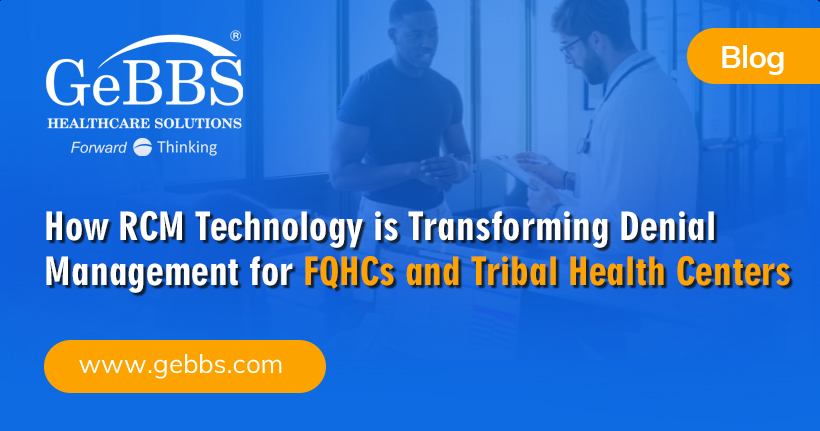Claim denials are among the most persistent challenges in healthcare revenue cycle management (RCM). For Federally Qualified Health Centers (FQHCs) and Tribal Health Centers, denials create more than just administrative headaches—they can directly impact already limited budgets and the ability to serve vulnerable populations. Industry data from a 2024 Experian report shows denial rates across U.S. healthcare average between 10% and 15% of all claims. For resource-constrained providers, even a modest increase in denials can mean substantial revenue leakage.
The good news is that technology is reshaping denial management. Artificial intelligence (AI), automation, and advanced analytics enable providers to identify errors earlier, resolve issues faster, and prevent future denials. For FQHCs and Tribal Health Centers, adopting the right RCM technology is no longer optional—it’s essential to financial sustainability and patient care.
The Rising Tide of Claim Denials
According to insights from Becker’s Hospital Review, denial rates across healthcare are on the rise—driven by stricter payer requirements, incomplete documentation, and credentialing issues. For FQHCs and Tribal facilities, where margins are already thin, every denied claim represents both lost revenue and delayed care.
Denial rates have steadily climbed in recent years, driven by tighter payer scrutiny, complex coding requirements, and evolving regulations. According to an MGMA stat poll, 60% of medical practices report an increase in denials in 2024 compared to the same period in 2023, with Medicaid and Medicare being among the most challenging payers.
For FQHCs and Tribal providers, where Medicaid and Medicare represent a significant portion of the payer mix, denials translate to slower reimbursements and more staff time spent chasing revenue. Unlike larger hospital systems, these centers often lack the financial reserves to absorb delays.
Why Traditional Approaches Are No Longer Enough
Historically, denial management has relied heavily on manual processes: staff combing through claims, identifying errors, and drafting appeals. While effective in isolated cases, this approach is:
- Time-consuming – Denials may sit unresolved for weeks.
- Resource-intensive – FQHCs and Tribal Health Centers often cannot maintain large billing teams.
- Reactive – Errors are caught only after claims are denied.
- Risk-prone – High potential for human error and compliance oversights.
With denial rates increasing, these manual methods are unsustainable for safety-net providers.
RCM Technology to the Rescue
1. AI-Driven Claim Scrubbing
AI-powered systems review claims in real time, flagging potential issues such as missing modifiers, eligibility mismatches, or incorrect coding. These systems can use predictive models that analyze past denial patterns to pre-emptively correct claims before submission. This reduces the likelihood of rejections and speeds up first-pass acceptance rates. Research from TechTarget shows how AI is being applied to predict which claims are most at risk of denial. For FQHCs, this means billing staff can proactively fix claims before submission.
2. Automated Denial Tracking & Root Cause Analysis
Modern denial management platforms automatically categorize denials by reason, payer, and claim type. It is best practice to have dashboards and work queues that allow billing teams to focus on the highest-value claims first. Some systems even generate templated appeal letters, reducing administrative burden and ensuring consistency.
3. Interoperability & EHR Integration
One of the most critical advancements is seamless integration between EHRs (like Epic and NextGen) and RCM platforms. This allows coding, billing, and clinical data to flow together without silos. Integration not only reduces duplicate data entry but also ensures coding accuracy, which directly lowers denial rates.
4. Analytics & Benchmarking
RCM technology provides powerful reporting tools. By leveraging MGMA benchmarks, FQHCs can compare denial performance to national peers, identify patterns (e.g., frequent eligibility issues with Medicaid), and implement preventive strategies. These insights shift denial management from reactive clean-up to proactive prevention.
Special Considerations for FQHCs and Tribal Health Centers
For FQHCs and Tribal facilities, the case for technology is even stronger:
- Staffing shortages – Smaller billing teams make automation critical.
- Complex payer mix – Heavy reliance on Medicaid and Medicare creates unique denial risks.
- Regulatory oversight – CMS requires strict compliance, increasing the administrative load.
- Cultural and community priorities – Automating billing tasks allows staff to focus on direct patient engagement, building trust within the community.
According to IHS, Tribal facilities face additional infrastructure challenges, making cloud-based RCM systems particularly valuable for scalability and accessibility.
The ROI of RCM Technology
The business case for denial management technology is clear. Providers implementing automated denial management tools can see benefits, including:
- 30–40% reduction in rework costs
- 20–25% faster cash flow
- Significant improvements in clean claim rates
For FQHCs and Tribal Health Centers, this translates into more consistent revenue streams, reduced reliance on manual labor, and ultimately more resources available for direct patient services.
Outsourcing denial management to technology-enabled partners can increase ROI by providing both the platform and the expertise needed to optimize performance.
How CPa Medical Billing Supports FQHCs & Tribal Health Providers
At CPa Medical Billing, a GeBBS Healthcare company, we understand the unique challenges faced by FQHCs and Tribal Health organizations. Our approach combines advanced RCM technology with human expertise, ensuring that denials are managed and prevented.
- Epic and EHR integration expertise – Seamlessly connecting billing and clinical systems.
- Automation & analytics – Tools that improve claim accuracy and track payer trends.
- Dedicated denial teams – Experienced specialists who manage appeals and root cause resolution.
- Compliance focus – Alignment with CMS and Medicaid/Medicare requirements.
By partnering with CPa, safety-net providers gain a trusted ally who can help stabilize cash flow, reduce administrative burden, and keep focus where it belongs—on patient care.
Conclusion
Denials are a growing problem across healthcare, but they are especially harmful for FQHCs and Tribal Health Centers. Traditional manual approaches can no longer keep pace with payer complexity and resource constraints. RCM technology offers a transformative solution—reducing errors, accelerating reimbursements, and freeing staff for mission-critical work.
For providers committed to serving vulnerable populations, adopting advanced denial management technology is about more than financial stability—it’s about ensuring the long-term viability of patient care.
FAQs
- What is denial management in RCM?
Denial management refers to identifying, appealing, and preventing claim denials to ensure providers receive accurate reimbursement.
- What are the most common reasons for claim denials?
Eligibility issues, missing or incorrect coding, prior authorization errors, and timely filing are among the top causes of denial.
- How does AI reduce medical billing denials?
AI tools flag errors before submission and learn from historical data, increasing clean claim rates and reducing the need for appeals.
- Why are denial rates higher at FQHCs and Tribal Health Centers?
These providers rely heavily on Medicaid/Medicare, which have complex rules, and often have limited billing staff to manage the volume.
- What are the most common causes of claim denials for FQHCs and Tribal Health Centers?
According to MGMA and HFMA, the leading causes are credentialing errors, missing documentation, and eligibility verification issues. - How does AI help reduce denials?
TechTarget reports that AI-powered RCM tools analyze past claim patterns to flag high-risk submissions, allowing staff to fix errors before sending them to payers. - Is RCM technology affordable for smaller health centers?
Yes. Many vendors now offer modular, cloud-based platforms for FQHCs and Tribal health organizations, making advanced denial management tools more accessible. - How does CMS support enrollment for providers at FQHCs?
CMS offers online enrollment through PECOS and provides Medicaid & CHIP resources to streamline credentialing, which directly reduces enrollment-related denials. - Why is denial management especially important for Tribal Health Centers?
Tribal facilities often face funding limitations and higher patient needs. Every denied claim directly impacts their ability to reinvest in critical infrastructure and expand care access, as noted in CMS’s Tribal health resources.
👉 By adopting advanced RCM technology, FQHCs and Tribal Health Centers can move from reactive denial management to proactive revenue cycle optimization—ensuring that more resources are directed where they matter most: patient care.






